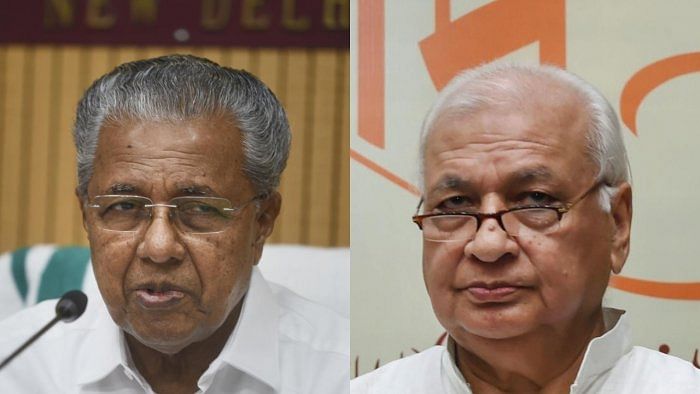
Kerala Chief Minister Pinarayi Vijayan and Governor Arif Mohammed Khan.
Credit: PTI Photos
When a member of the Constituent Assembly wrote to Gandhiji suggesting the abolition of the gubernatorial office, he replied, “The Governor had been given a very useful and necessary place in the scheme of the team. He would be an arbiter when there was a constitutional deadlock in the State and he would be able to play an impartial role.” If the Mahatma were to witness the recent political slugfest between Kerala Chief Minister Pinarayi Vijayan and the governor of the state, Arif Mohammad Khan, he would be aghast at the political resonance that now permeates the high office of the Governor.
At the time of going to press, a matter is pending before the Supreme Court, wherein the State of Kerala has challenged Khan’s inaction on various bills pending before him for assent. The state’s contention is that the governor’s inactions are threatening the basic foundations of the Constitution and that the indefinite pendency of the bills amounts to manifest arbitrariness, thereby violating Articles 14 and 21 of the Constitution. The mistrust between the two functionaries has widened to such an extent that while touring a busy street in Kozhikode, Khan refused police protection, stating that the CM had made the force ineffective by interfering in its activities. The CM retaliated by promising to move the Prime Minister and the President to “rein in” Khan from vitiating the state’s peaceful atmosphere.
Strife between governors and CMs is not new to India. The only time their relations were relatively placid was from independence until 1967, when the Congress exerted sway over most of the states. This changed after the fourth general election, when regional parties like TMC, CPI (M), DMK, etc. stormed to power in multiple states. A multi-party political landscape laid bare the subterranean challenges associated with the gubernatorial office. For instance, soon after the 1967 elections, the Governor of Rajasthan suspended the state assembly and declared the president’s rule despite non-Congress groups having a clear majority. The abuse of the office has become a familiar narrative ever since, with governments at the
Centre installing party-loyalists as governors.
A governor is not merely a figurehead but an integral functionary under the Constitution. As the constitutional head of a state, he is vested with real duties and powers, including appointing the Chief Minister and high court judges, summoning the state legislature, dissolving the Assembly if state machinery fails, and reporting to the President for the imposition of the President’s rule. The most important duty, however, is his constitutional obligation to act as a bridge in the chain of relationships between the Centre and the states. He is not expected to play an active role in the governance of a state but to act as an adviser to the ministry, ensuring that administration is carried out at a level that may be regarded as good, efficient, and honest. When he subjugates his moral duty and starts acting as a puppet of the Union, the state machinery suffers. Such abnegation of duty does not only create crevices in centre-state relations but also casts a shadow on the prestige of the constitutional office itself.
Lack of a fixed tenure and absence of procedure for their dismissal make it almost impossible for governors to act as impartial heads. Further, the only qualifications for appointment as governor are that he should be a citizen of India and have attained the age of 35. This gives the government a free pass to appoint party stalwarts to the office. These discrepancies do underscore the need for amendments to the constitutional text. However, the nature of the office is such that its effectiveness will ultimately depend on the personal characteristics of the person holding it. A person with the right traits and disposition can rise above party politics, be a wise counsel to the ministry, and inspire confidence in people towards the State as a whole. The onus is therefore on the Centre to appoint the right individuals to this high office and prevent it from becoming a mockery in people’s eyes.
(The writer is a student at the National Law University, Jodhpur)